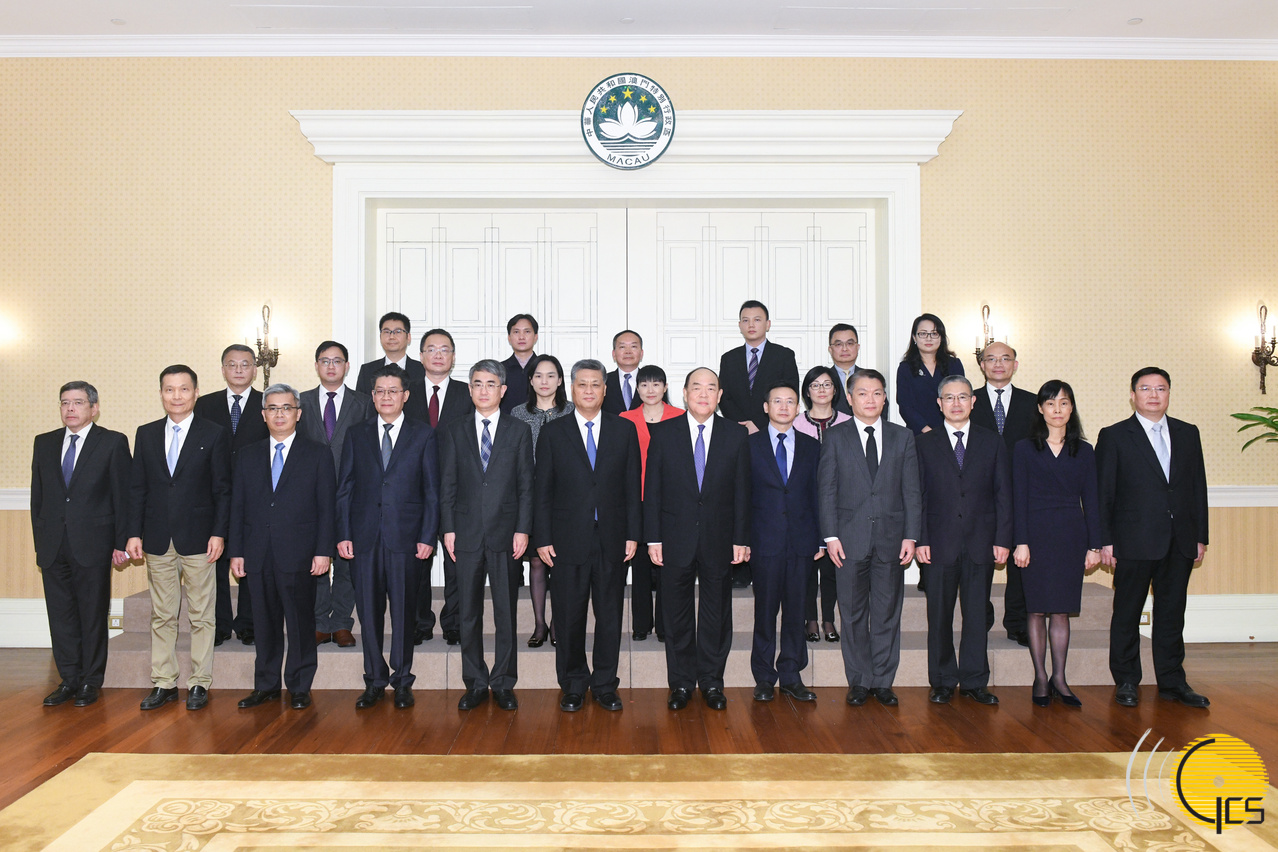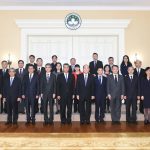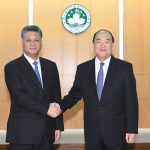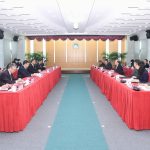 Members of the Macao SAR Government delegation and members of the Guangdong Government delegation pose for a group photograph prior to a meeting held in Macao regarding an overall plan for Guangdong-Macao intensive cooperation zone.
Members of the Macao SAR Government delegation and members of the Guangdong Government delegation pose for a group photograph prior to a meeting held in Macao regarding an overall plan for Guangdong-Macao intensive cooperation zone.
Macao and Guangdong Province are exploring how to bolster development of the Guangdong-Hong Kong-Macao Greater Bay Area and existing cooperation, and discussing a proposal for development of a Guangdong-Macao “intensive cooperation zone” in Hengqin.
The topics were discussed in a meeting on Friday (13 March) chaired by the Chief Executive, Mr Ho Iat Seng, and the Governor of Guangdong Province, Mr Ma Xingrui. The meeting was convened in Macao to discuss development of the Guangdong-Macao “intensive cooperation zone”.
In his address, Mr Ho stressed the new-term Government of the Macao Special Administrative Region (SAR) paid great attention to closer cooperation between Guangdong and Macao and hoped to adopt a more innovative approach to overcome existing challenges to the advancement of cooperation.
Mr Ho added that an “intensive cooperation zone” suggested for Hengqin island, in Zhuhai, was a project that would involve further bilateral effort in order to push forward – innovatively yet practically – Guangdong-Macao ties.
To accelerate development of an “intensive cooperation zone” in Hengqin, the Chief Executive pointed out that Macao would continue to complement its regulatory advantages – under the “One country, two systems” principle – with Hengqin’s strengths in terms of its geographical location, resources and space. These strengths would help in terms of the two sides advancing the exploration of new cooperation models, and in terms of aligning mechanisms for joint effort.
During the meeting, Mr Ho also mentioned that with joint effort from both sides, epidemic control work in relation to COVID-19 – an illness linked to the novel coronavirus – had achieved significant results. He added Macao would remain in close communication with Guangdong for furtherance of disease-control work.
Mr Ho also expressed his appreciation for the Guangdong Government’s effort to ensure stable supply to Macao of resources, fresh food and daily necessities during COVID-19 episode.
In the meeting, Mr Ma spoke highly of Macao’s effort to contain COVID-19 and to prevent it spreading within the community. He added that Guangdong would continue to work in line with the Central Government’s overall planning on epidemic control.
Hengqin had always been a focal point for cooperation between Guangdong and Macao, and one of the visions of such cooperation was to assist in Macao’s adequate economic diversification effort, said Mr Ma.
Mr Ma said he was looking forwarding to working closer with the new-term Government to explore further opportunities for economic development, from a perspective of overall national strategies, and the country’s reform and opening up policies. He added the two sides would step up effort to transform Hengqin as a trial zone for new practices in relation to the “One country, two systems” principle, as outlined by President Xi Jinping when he was in Macao to mark the 20th anniversary of the SAR.
Macao officials attending Friday’s meeting included: the Secretary for Administration and Justice, Mr Cheong Weng Chon; the Secretary for Economy and Finance, Mr Lei Wai Nong; the Secretary for Security, Mr Wong Sio Chak; the Secretary for Social Affairs and Culture, Ms Ao Ieong U; and the Secretary for Transport and Public Works, Mr Raimundo do Rosário.
Other representatives of the Guangdong Government attending the meeting included Deputy Governor Mr Zhang Xin; and the Secretary of the Zhuhai Municipal Committee of the Communist Party of China, Mr Guo Yonghang.




